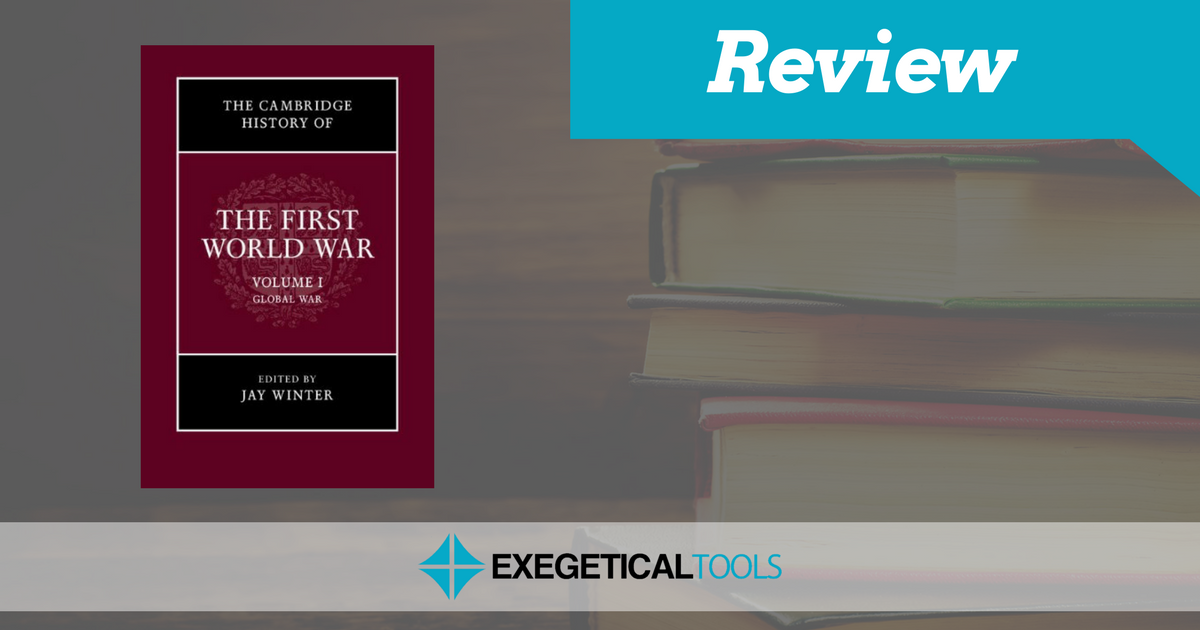
The Cambridge History of the First World War, edited by Jay Winter et al. (Cambridge: Cambridge University Press, 2014 [2016 paperback]). 3 volumes.
What does World War I have to do with biblical studies? Not much directly, but much tangentially. Biblical studies requires ethical theory, which obviously includes issues such as “just war theory” (how do we understand all of Israel’s wars?). The Bible is filled with military accounts, songs of victory, laments of loss, and descriptions of weapons and battle tactics. The stark contrast of the mechanized and industrialized type of war carried out in the First World War provides illustrative history against which to read the ancient battle accounts. We might also learn about what happens to states and societies during war time. Moreover, Christians have a stake in understanding history, especially the history of the bloodiest century in history, so we can act as intelligent and informed forces for good in the coming centuries.
This new three-volume history of the First World War is a treasure trove of historical and social analysis. Prior to these three volumes, as the editor Winter explains, there were three generations of WWI chroniclers. The first generation included those involved in the war, giving primary accounts–some were winners explaining how they were successful, and some were attempting to exculpate themselves. The second generation (named “fifty years on”) wrote in the 1950s and 1960s and focused more on society than just military activity. Access to film from various nations allowed the history to spread to the public en mass. The third generation wrote during the Vietnam war into the 1980s, when the public began looking upon war as catastrophic rather than honorable or just.
Three books especially helped color WWI as catastrophic and vastly different than any war in the past. Paul Fussell’s The Great War and Modern Memory (1975) showed how anticipations and outcomes were wildly different. Trench warfare, gas weaponry and artillery eradicated any sense of glory in war. Sir John Keegan’s The Face of Battle (1976) demonstrated how previous warfare allowed soldiers to retreat, but WWI gave soldiers no way out; it was mass slaughter. Eric Leed’s No Man’s Land: Combat and Identity in World War I explored the mental breaking point of soldiers in the trenches, who knew they would likely never make it out alive, no matter how valiant or skilled they were.
This three-volume Cambridge History analyzes the global war (volume 1), the state (volume 2), and civil society (volume 3). It takes a transnational perspective, which takes the focus away from strictly Europe and the Western front to look also at issues that arose similarly in the different countries involved. These issues include economic effects, refugees, transformation of the state, etc. The first part of volume one gives a narratival history of the origins of the war and its happenings, while the rest of the volumes are topical.
Several sections would be of interest to Christian scholars and ethicists, such as “Atrocities and war crimes” (ch. 21, vol. 1), “Genocide” (ch. 22, vol. 1), “The laws of war” (ch. 23, vol. 1), “War economies” (ch. 12, vol. 2), “Pacifism” (ch. 21, vol. 2), “The couple,” “Children,” and “Families” (chs. 1-3, vol. 3), “Men and women at home” (ch. 5, vol. 3), “Beliefs and religion” (ch. 17, vol. 3), and more.
Some issues are of direct interest to current events. For example, the chapter that discusses refugees notes that the US closed its borders to refugees fleeing violence on the Continent. Reading about the repercussions of this decision stirs thoughts about the current Syrian refugee crisis and allows us to think about the issue more intelligently.
Being a Cambridge history, the participants are of course all experts in their subject. But they are also a very international group. This global perspective brings a depth to the transnational perspective that the volumes try to achieve. If you have the chance to acquire this set, it would be well worth having and a pleasure to read.
Find if here on Amazon.

